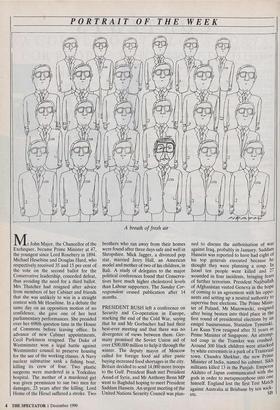PORTRAIT OF THE WEEK
A breath of fresh air Mr John Major, the Chancellor of the Exchequer, became Prime Minister at 47, the youngest since Lord Rosebery in 1894. Michael Heseltine and Douglas Hurd, who respectively received 35 and 15 per cent of the vote on the second ballot for the Conservative leadership, conceded defeat, thus avoiding the need for a third ballot. Mrs Thatcher had resigned after advice from members of her Cabinet and friends that she was unlikely to win in a straight contest with Mr Heseltine. In a debate the same day on an opposition motion of no confidence, she gave one of her best parliamentary performances. She presided over her 698th question time in the House of Commons before leaving office. In advance of new Cabinet appointments, Cecil Parkinson resigned. The Duke of Westminster won a legal battle against Westminster council to preserve housing for the use of the working classes. A Navy nuclear submarine sank a fishing boat, killing its crew of four. Two plastic surgeons were murdered in a Yorkshire hospital. The mother of a murdered girl was given permission to sue two men for damages, 23 years after the killing. Lord Home of the Hirsel suffered a stroke. Two brothers who ran away from their homes were found after three days safe and well in Shropshire. Mick Jagger, a divorced pop star, married Jerry Hall, an American model and mother of two of his children, in Bali. A study of delegates to the major political conferences found that Conserva- tives have much higher cholesterol levels than Labour supporters. The Sunday Cor- respondent ceased publication after 14 months.
PRESIDENT BUSH left a conference on Security and Co-operation in Europe, marking the end of the Cold War, saying that he and Mr Gorbachev had had their best-ever meeting and that there was no divergence of views between them. Ger- many promised the Soviet Union aid of over £500,000 million to help it through the winter. The deputy mayor of Moscow called for foreign food aid after panic buying increased food shortages in the city. Britain decided to send 14,000 more troops to the Gulf. President Bush met President Assad of Syria, and Mr Anthony Senn MP went to Baghdad hoping to meet President Saddam Hussein. An urgent meeting of the United Nations Security Council was plan-
ned to discuss the authorisation of war against Iraq, probably in January. Saddam Hussein was reported to have had eight of his top generals executed because he thought they were planning a coup. In Israel ten people were killed and 27 wounded in four incidents, bringing fears of further terrorism. President Najibullah of Afghanistan visited Geneva in the hope of coming to an agreement with his oppo- nents and setting up a neutral authority to supervise free elections. The Prime Minis- ter of Poland, Mr Mazowiecki, resigned after being beaten into third place in the first round of presidential elections by an emigre businessman, Stanislaw Tyminskt. Lee Kuan Yew resigned after 31 years as Prime Minister of Singapore. An attemp- ted coup in the Transkei was crushed. Around 300 black children were attacked by white extremists in a park of a Transvaal town. Chandra Shekhar, the new Prime Minister of India, named his cabinet. Sikh militants killed 13 in the Punjab. Emperor Akihito of Japan communicated with the gods in order to metapmorphose into one himself. England lost the first Test Match against Australia at Brisbane by ten wick-
ets. SB










































































 Previous page
Previous page